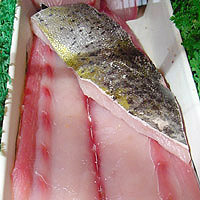Gluten Free
What does following a gluten-free diet mean? That you're embarking on an easy diet with a wide range of health-promoting effects. Instead of dwelling on what you’re giving up, consider that you’re going to enjoy a whole new world of delicious food options to meet your special dietary needs. You’ll be eating seasonally, choosing more fresh fruits and vegetables, focusing on meats, seafood, poultry, legumes, lentils, corn, and rice, and discovering fascinating ancient grains such as quinoa, amaranth, and millet. You’ll be able to eat potatoes, eggs, most cheeses, even chocolate (!)—and enjoy them without guilt because you’ll be taking good care of your body. In fact, you’ll probably end up eating—and feeling—better than ever!
Visit this page for more information about living Gluten Free
---
We carry a large variety of gluten free items, the brands listed below represent just some of the offerings we carry















More Diets
Mahi Mahi

Preparation, Uses, & Tips
The secret to successful mahi mahi cookery is to not overcook. Whichever of the following cooking methods you choose, your mahi mahi will be cooked when its flesh becomes opaque but is still moist on the inside.
Baking
Rinse fish and pat dry with a paper towel. Place steaks or fillets in baking pan, brush with oil or butter, or cover with sauce made of liquid, herbs and spices, and vegetables. Bake in preheated oven at 400°F (200°C) until a knife slice in the thickest part reveals the flesh to be opaque but still moist.
Grilling
Place steaks or fillets directly on greased grill, 4 to 6 inches (about 10 to 15cm) above prepared coals or fire. Baste with butter, oil, or marinade and close the hood of the grill. For a large fillet, place fish skin-side-down on foil. Cook until opaque and moist on the inside, about 6 to 8 minutes for fish less than 1-inch (about 2.5cm) thick, and 10 to 15 minutes for fish larger than 1-inch (about 2.5cm) thick.
Broiling
Rinse mahi mahi fillets and pat dry with a paper towel. Place fish on a rack above a baking dish. Preheat broiler and adjust oven rack so fish is 3 to 4 inches (about 7.6 to 10cm) from the element. Broil, turning once, until fish is opaque but still moist in the center, about 6 to 10 minutes, depending on the size of the fish.
Frying
Rinse mahi mahi, and pat dry with a paper towel. Dredge in flour and seasonings if desired. Shake off any excess flour. Heat frying pan until hot. Add butter or oil, place fillets in the pan, and cook, turning once, until opaque but still moist in the center—about 2 to 10 minutes, depending on the size of the fish.
Poaching
Bring poaching liquid consisting of water, broth, herbs, and spices to a simmer. Slip in mahi mahi, then cover the pan and keep liquid at a simmer for about 8 minutes per inch (about 2.5cm) of thickness.
Copyright © 2025 TraceGains, Inc. All rights reserved.
Learn more about TraceGains, the company.
The information presented in the Food Guide is for informational purposes only and was created by a team of US–registered dietitians and food experts. Consult your doctor, practitioner, and/or pharmacist for any health problem and before using any supplements, making dietary changes, or before making any changes in prescribed medications. Information expires December 2025.











